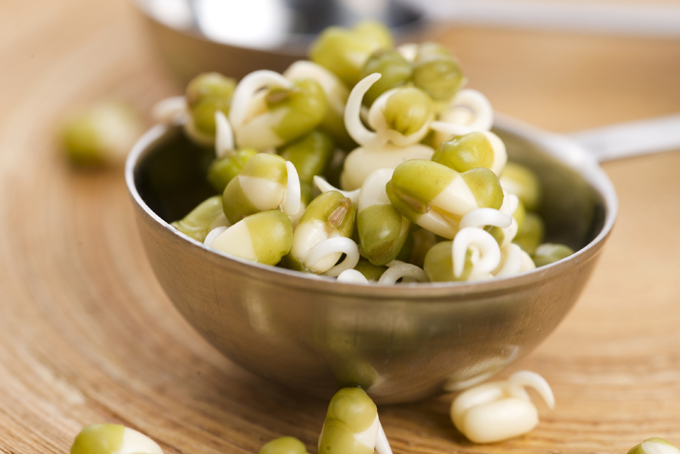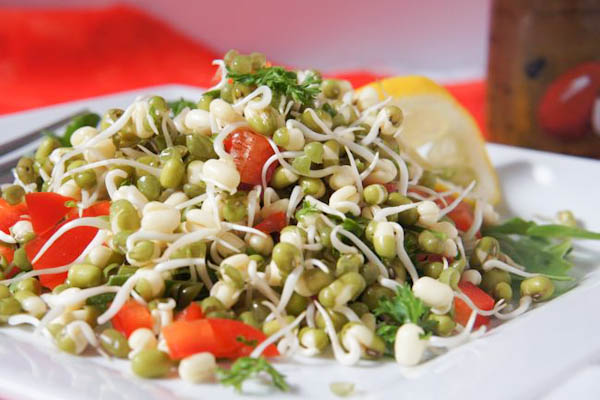
Mung beans, or Chinese bean sprouts, are the most widely consumed sprout in the world. They are fun to grow and lend themselves to great recipes, especially if you like asian food. Mung bean sprouts are one of the easiest to digest foods. Their concentration of bioactive compounds can help prevent prostate problems, glandular dysfunction, and breast cancer, as well as premature balding and greying. They are a great source of protein minus the saturated fat and cholesterol that you would get from animal sources. If you do have high cholesterol, you will benefit from eating mung beans daily because, in addition to having no cholesterol, mung bean sprouts are an excellent source of soluble dietary fibers.
Sprouting mung beans increases vitamin B1 by up to 285%, vitamin B2 by to 515%, and niacin by up to 265%. One study reported that “germination of mung bean sprouts significantly increased phytochemical content, vitamin C content, and antioxidant activity.”
Beans such as the mung bean variety contain isoflavone nutrients. Isoflavones help regulate hormonal activity, helping to reduce hot flashes for post-menopausal women and preventing the often devastating effects of osteoporosis by stimulating bone formation.
Mung beans are a low glycemic index food, which means the beans are a diabetic friendly food. People who eat foods that have a low glycemic index tend to have lower total body fat levels.
Mung and other type of beans contain protease inhibitors. Protease inhibitors slow the replication of certain cancer cells, and are known to block and prevent formation of tumor cells.
Mung beans contain anti-aging components for the skin. Phytoestrogens stimulate the synthesis of collagen and elastin, which are essential components of the skin’s structure.
Little history lesson: For thousands of years mung beans have been used for a variety of purposes. Mung beans originated in India and were cultivated throughout Asia. The ancient Chinese used mung beans for culinary and medicinal purposes such as dispelling heat and detoxifying the body. Today mung beans are still being used for culinary and health purposes due to the beans’ high nutritional content and value.

Lastly, you could have a fresh, steady supply of nutritious sprouts every day- compared to the stale, nutrient-depleted variety available at your local health store. Mung beans are so easy and fun to grow in our Sprouting Kit. Just place a cup of seeds in our sprouting jar, follow our instructions and within 3 days the sprouts will emerge to fill the jar to capacity! We then enjoy them on their own as snacks, in salads, stir-fry, or in recipes such as a Vietnamese soup that we make with rice noodles, mushrooms, and other vegetables. Freshly cut ginger and Braggs Liquid Aminos seasoning (an organic soy sauce) are often used in many of our asian recipes for added taste.
Nutritional info:
Vitamins A, B, C and E,
Calcium, Iron, Magnesium, Potassium, Zinc,
Fiber, Amino Acids
Protein: 20%
Traditionally Used for:
- Premature balding
- Premature aging
- Breast cancer
- Prostate
- Diabetes
- Cholesterol
- Hypertension
- Weight loss
- Protein source
- Detox
- Post-menopause





















